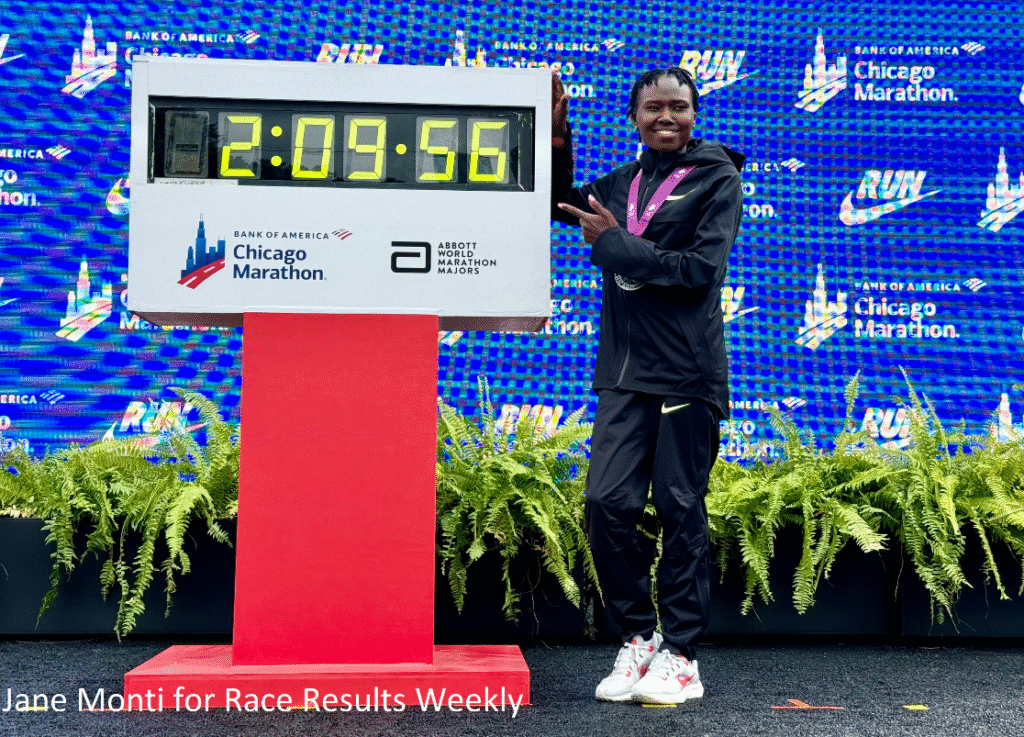By David Monti, @d9monti
(c) 2025 Race Results Weekly, all rights reserved
(17-Jul) — Ruth Chepngetich, the 2019 World Athletics Championships marathon gold medalist who ran a world record 2:09:56 at the Bank of America Chicago Marathon last October, has been provisionally suspended by the Athletics Integrity Unit (AIU) for a doping infraction. The 30 year-old Kenyan tested positive for Hydrochlorothiazide (HCTZ), a diuretic, in a urine sample collected from her on March 14 of this year.
Under AIU procedures, the athlete was issued a Notice of Charge after an investigation was launched. Chepngetich was interviewed by AIU investigators in Nairobi on April 16 and “complied with requests regarding our investigation,” according to AIU chief Brett Clothier.
“When there is a positive test for diuretics and masking agents, a provisional suspension is not mandatory under the World Anti-Doping Code,” Clothier explained through a press release. “Chepngetich was not provisionally suspended by the AIU at the time of notification. However, on 19 April, she opted for a voluntary provisional suspension while the AIU’s investigation was ongoing.” Clothier continued: “In the intervening months, the AIU continued its investigation and today issued a Notice of Charge and imposed its own provisional suspension.”
The AIU said that they would have no further comment on the case until it reached its conclusion. A diuretic does not increase performance per se, but can mask the presence of other drugs. Hydrochlorothiazide, and other diuretics, are “banned at all times,” according to the World Anti-Doping Agency.
An HCTZ reading of 20 nanograms per milliliter in urine would be considered a negative result, but Chepngetich tested at a far higher level: 3800 ng/mL.
Although Chepngetich’s world record in Chicago was ratified by World Athletics, the mark was looked upon with doubt by at least some experts. She slashed the previous world record by a hefty one minute and 57 seconds, and would have finished 11th in the men’s race. She ran the first half in 1:04:16, and her halfway split was the fastest-ever half-marathon run in the United States by a woman.
Former Runners’ World editor and 1968 Boston Marathon champion Amby Burfoot was openly skeptical of Chepngetich’s performance. Writing for marathonhandbook.com, Burfoot wrote: “Chepngetich’s performance is only about 7.75% slower than Kelvin Kiptum’s men’s marathon world record. It should be 10 to 11% slower, like all the other male-female differentials in the running record books. There’s a massive amount of data behind these percentages, and historically any small variation amounts to a highly suspect performance.”
During the post-race press conference in Chicago, Robert Johnson of Letsrun.com asked Chepngetich how her then-pending record should be viewed given the dozens of doping violations recorded by the AIU for Kenyan athletes in recent years. Johnson said: “What would you say to someone that, when they see 2:09:56, say this is too good to be true?” Chepngetich hesitated before saying she didn’t know. Johnson was criticized by Kenyan officials, including some in the Kenyan National Assembly, who saw his question as insulting.
Seven Kenyan athletes received doping sanctions in June, and there are currently 139 Kenyan athletes serving doping bans, the most of any country.
Chepngetich has only competed once since her Chicago run. She took second at the Lisbon Half-Marathon on March 9th. She was supposed to compete in the TCS London Marathon on April 27, but withdrew prior to the race.
“I’m not in the right place mentally or physically to race my best in London and I am therefore withdrawing,” Chepngetich said through a statement provided by London Marathon Events. “I am very sad to miss the race and I hope to be back next year.”
PHOTO: Ruth Chepngetich after setting her marathon world record at the Bank of America Chicago Marathon on October 13, 2024 (photo by Jane Monti for Race Results Weekly)
Chepngetich_Ruth_WR_Clock__Chiacgo_Marathon_2024_Jane_Monti_With_Credit.jpg

